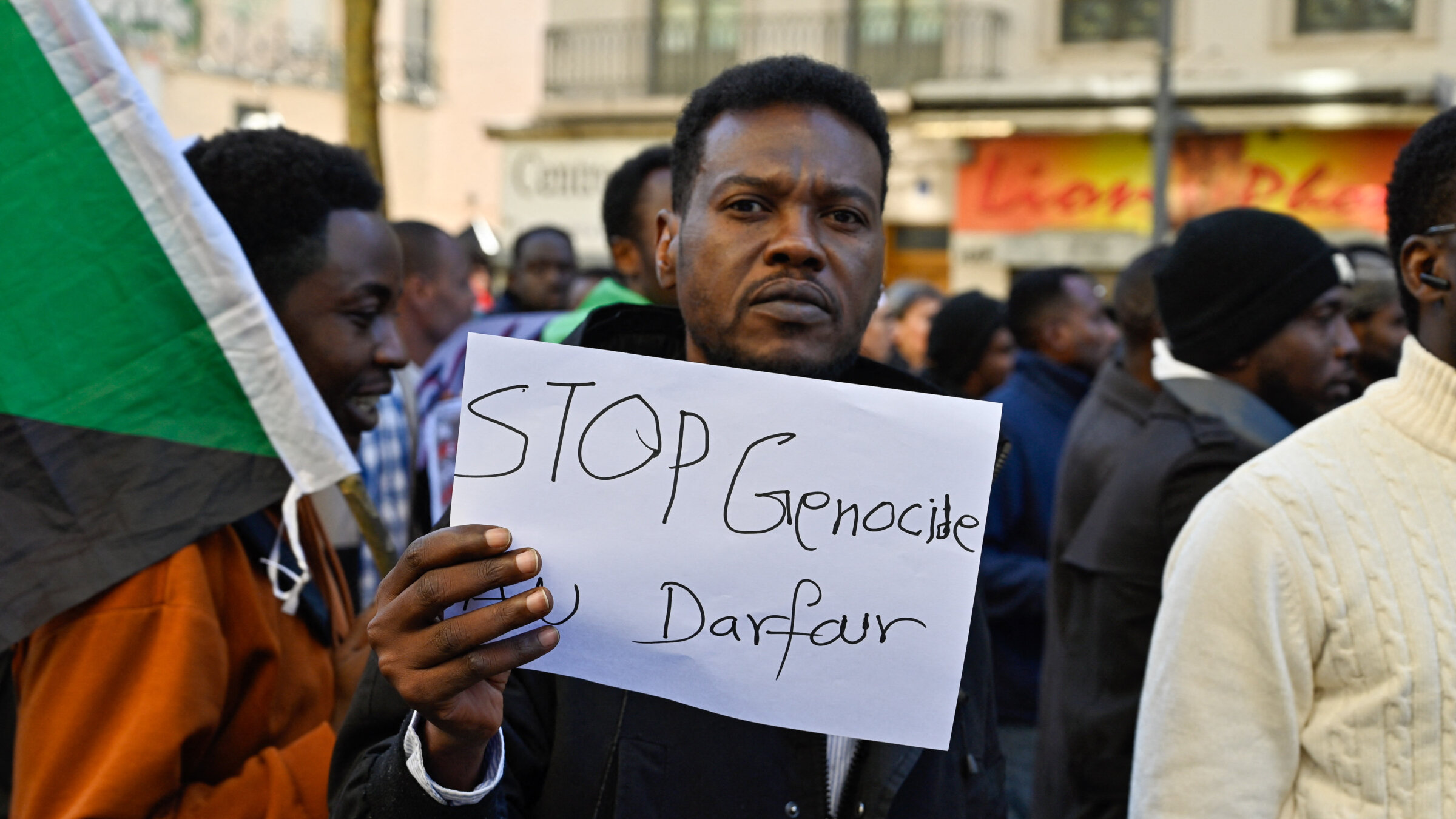Why won’t pro-Palestinian protesters turn their attention to Darfur?
An American ally is funding mass slaughter in Sudan. American protesters are nowhere to be found.

A protester during a demonstration in support of the Sudanese people in Lyon, France, Nov. 8. Photo by Matthieu Delaty/Hans Lucas/AFP via Getty Images
Here’s a stark fact: More people may have been killed in Sudan in just the past week than in Gaza in the past two years.
“They’re killing everyone that moves,” said Nathaniel Raymond, executive director at Yale’s Humanitarian Research Lab, in a recent interview with Mehdi Hasan. Raymond’s lab has tracked the carnage via satellite imagery, witnessing the slaughter of innocent civilians in real time.
And the main source for the weapons destroying the Black, non-Arab population in Darfur is the United Arab Emirates, one of the United States’ closest allies in the Middle East.
So where are the American protesters?
A major reason American protesters have relentlessly focused their time and energy on Israel, they say, is that the U.S. is Israel’s most significant ally, as well as an arms supplier to the IDF. There are real actions the U.S. could take to sway the course of events in Israel, so protesters aim to influence the U.S. government to do so.
But the U.S. has ties to conflicts all over the world, especially in Sudan, where a major American ally is helping supply the weapons of slaughter. The idea that its ability to pressure Israel is unique, and therefore worthy of unique focus, is misguided.
“Only American pressure can stop the killing in Sudan,” wrote Alex De Waal, executive director of the World Peace Foundation, in Foreign Affairs. So why aren’t American activists, well, active?
A genocide to rival Rwanda
The UAE has $29 billion in active defense contracts with the U.S. It is also host to — and protected by — the 380th Air Expeditionary Wing and Jebel Ali Port, the U.S. Navy’s largest port of call in the Middle East.
And while UAE officials have denied that they are arming the Arab militia, known as the Rapid Support Forces, responsible for the genocide, diplomats, humanitarian groups and journalists have confirmed the link. Three of the same organizations that pro-Palestinian activists regularly cite in their brief against Israel — the United Nations, Human Rights Watch and Amnesty International — have established the UAE’s complicity.
Every crime American protesters accuse Israel of — killing civilians among military targets, rape, starvation as a weapon, destroying hospitals and killing patients in their beds — is happening now, at a far greater scale, in Darfur.
“Rebels hurl racial insults at fleeing women and children,” the Wall Street Journal reported. “Black women with long hair are systematically separated and raped.”
Humanitarian groups say the ongoing slaughter is likely to rival that of Rwanda genocide, and of the genocide that took place in the same Darfur region 30 years ago. That atrocity, led by a predecessor to the RSF, claimed 200,000 lives.
Why would the UAE supply weapons to be used in such a context? Perhaps because it uses Sudan’s mines to supply gold and other resources, and wants to stay on the good side of a group primed to exercise control over ongoing access.
“The war would be over if not for the UAE,” Cameron Hudson, a former chief of staff to successive U.S. presidential special envoys for Sudan, told the Wall Street Journal. “The only thing that is keeping them in this war is the overwhelming amount of military support that they’re receiving from the UAE.”
In the US, silence
So where are the protesters shouting at their representatives in town halls to suspend the recent $2 trillion investment agreement between the U.S. and UAE? Pushing sanctions against the UAE? Or demanding New York University shutter its Abu Dhabi campus?
Where are the movie stars and directors refusing to engage with the UAE, which according to Variety is the “prime Middle East hub” for Hollywood production? Javier Bardem, who recently said he will no longer work with the Israeli film industry, filmed part of his last movie, F1, in Abu Dhabi last year. What if he said no more?
Imagine the impact if, instead of unveiling her new fragrance, Orebella, at a splashed-out event last week in Abu Dhabi, supermodel Bella Hadid announced that just as she calls relentlessly for the world to boycott Israel, she will no longer visit the Emirates until it ends funding for the genocide in Darfur?
This is not an argument for whataboutism, and none of this is to deflect attention from the injustices and suffering happening in the West Bank and Gaza. Everyone has a right to choose their battles. I don’t ask the Save the Whales people, “But what about the rainforest?”
But if someone is actively bombing the rainforest, today, as you read this — and your country is in bed with the bomb suppliers — then claiming to care about the planet and doing nothing is inexcusable.
“This is not only a crisis of violence but also a crisis of indifference,” wrote Reena Ghelani, CEO of Plan International in Al Jazeera. “Each day the world looks away.”
And the go-to excuse, that Americans lack leverage and influence over the slaughter, is utter BS.

















